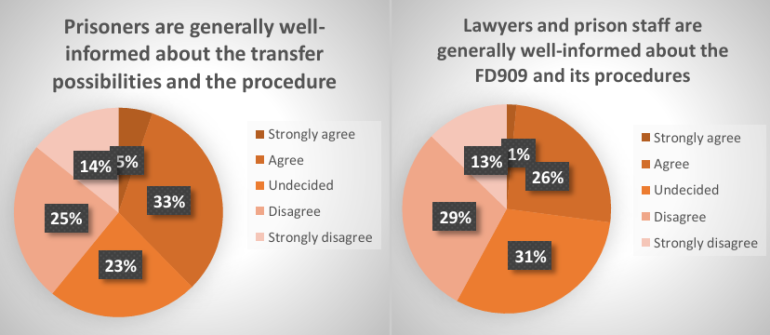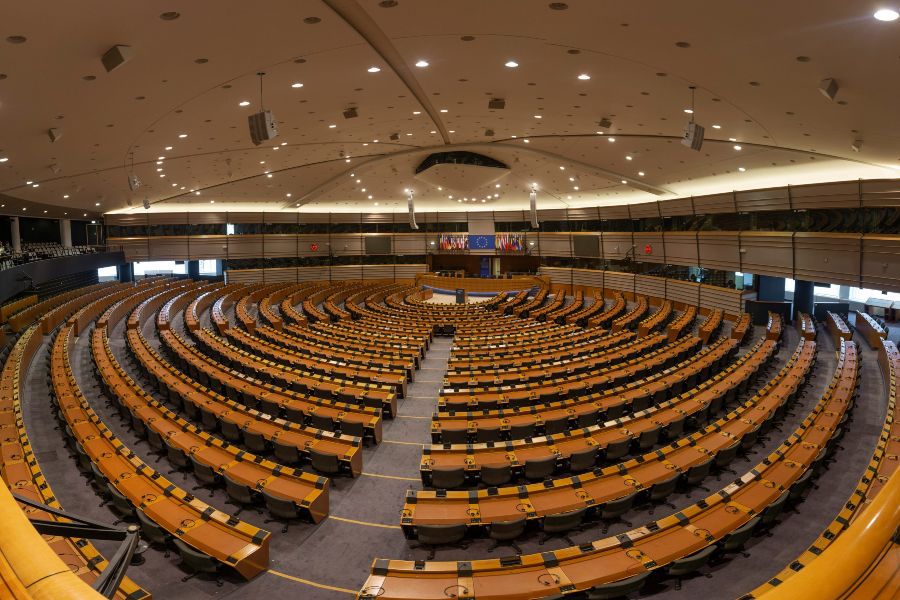Article
Esther Montero Peréz de Tudela
EU citizen in EU prisons: Importance of Framework Decision 2008/909/JHA
According to the Council of Europe Annual Criminal Statistics (SPACE) for 2023, on average, 27% of prisoners in European prisons are foreigners, with an average of 30% of foreign prisoners holding citizenship from a Member State of the European Union.¹
These figures highlight the importance of enhancing international legal cooperation between EU Member States, particularly through Framework Decision 2008/909/JHA (FD 909), on the application of the principle of mutual recognition to judgments in criminal matters imposing custodial sentences or measures involving deprivation of liberty for the purpose of their enforcement in the EU.
FD 909 establishes the conditions under which a Member State, with a view to facilitating the social rehabilitation of the sentenced person, can recognise a judgment and enforce the sentence. Naturally, this direct objective of improving the social reintegration of those sentenced to prison terms ultimately aims to reduce the rate of recidivism and improve community safety.
The system devised by the Framework Decision 2008/909/JHA
Seeking effectiveness and efficiency, and in relation to the previous system of transfer of convicted persons devised by the Strasbourg Convention on the transfer of sentenced persons of 1983, FD 909 introduced several key innovations.
It establishes a streamlined transfer procedure based on direct contact between the competent authorities for executing and recognising custodial sentences. Another novelty is the establishment of a 90-day maximum timeframe for the decision-making process, and the establishment of a list of offences that do not require verification of double criminality by the Executing State. Additionally, in specific cases, FD 909 permits transfers without the consent of the sentenced person – for instance, when the sentenced person is to be transferred to the Member State in which they reside or to the which they will be deported upon sentence completion.
Reality shown by the research: Framework Decision 2008/909/JHA has not yet
reached its full potential
Research conducted under the framework of the REUNION project reveals that FD 909 is not yet widely implemented to its full potential. Two surveys were conducted between June and July 2023 across 20 EU jurisdictions: the first survey was aimed at the competent authorities (judges, prosecutors and other authorities), while the second survey targeted lawyers and professionals in the penitentiary environment, as well as similar practitioners. The surveys collected 133 answers, covering 83 responses in the first survey (covering 16 jurisdictions), and 50 in the second (covering 11 jurisdictions).
The results show that there is still a limited level of familiarity with the utilisation of FD 909 among practitioners, despite its more widespread use relative to FD 2008/947/JHA and FD 2009/829/JHA. Still, practitioners continue to report several difficulties linked to its de facto implementation.
The most prominent obstacles pointed out by the competent authorities were: (1) meeting the established deadlines, (2) identifying the competent authority in the Executing State (ES) and, (3) assessing rehabilitation prospects for transferred individuals.
Lawyers and penitentiary professionals identified additional obstacles such as: (1) long waiting times, namely in the retrieval of answers from the ES authorities, (2) limited knowledge of judicial procedures in the ES, (3) issues with the translation of relevant documentation, and (4) difficulties in completing and sharing the necessary documentation with the competent authorities.
Regarding the level of knowledge about the FD 909, in general, the respondents revealed to be familiar with the legislation (based on a self-reported and self-evaluated assessment). Nevertheless, the level of training received by the surveyed practitioners with regards to FD 909 was shown to be relatively low. On average, only 36,1% of the whole sample had received training in this area, with 28% of lawyers and correctional professionals and 41% of competent authorities having any kind of training on FD 909.
When asked if prisoners were generally well-informed about the transfer possibilities and the procedure, 38% of the legal operators and FD 909 related professionals interviewed agreed or strongly agreed about this idea. Most of them (62%) did not agree (24%), were not sure (undecided, 23%) or strongly disagree (14%) with this statement.

Similar results are revealed when surveyed professionals are questioned about level of agreement with the statement “Lawyers and prison staff are generally well informed about FD 909 and its procedures”. Only 27% agreed or strongly agreed (1%), while 31% were undecided, 29% disagreed and 13% strongly disagreed.
- The majority of those interviewed did not know if it is possible to apply FD 909 combined with FD 947 and FD 829 (60.2%), 11.3% considered it not to be possible and 28.6% considered it a possibility. These figures did not vary to a significant extent between the 2 groups surveyed;
- In addition, 96.2% of the sample has never applied (or seen applied) more than one FD to a specific case. As in the previous point, the figures between the 2 surveyed groups almost do not vary.
Practical impact on judicial cooperation and FD 909 across EU Member States:
recommendations and new ideas
The data collected indicates that FD 909 has not yet unleashed its full impact on judicial cooperation, and could be used more efficiently and widely across the EU. Recommendations include increasing training for competent authorities, lawyers and penitentiary staff.
Training programmes should prioritise pragmatic elements, such as facilitating a more consistent meeting of the procedural deadlines, expedite consultation processes, streamlining translations and reducing bureaucratic burdens. Improved mutual understanding of each Member State’s judicial system will positively impact mutual trust and efficiency in the transfer process.
A suggested shift in training strategy would place greater emphasis on training incarcerated persons about transfer procedures, as they are the primary stakeholders in the process. Following inmate-focused training, lawyer training should also be prioritised to improve procedural understanding.
To further integrate FD 909 within the judicial cooperation framework, raising awareness about the possibility of combining it with other FDs is necessary. Frequent and specialised training for competent authorities and other relevant professionals in this area is indispensable to encourage wider and more practical application.
Lastly, and in conclusion, using FD 909 more frequently as an alternative to European Arrest Warrant could have a positive impact on the social reintegration of convicted persons. As nearly three quarters of annual EAWs are issued to execute sentences in the issuing country, FD 909 could often provide a more socially rehabilitative approach, although this novel idea will be explored in future research.

Esther Montero Pérez de Tudela holds a law degree from the University of Seville and a PhD in Criminology (Magna Cum Laude) from the University of Lausanne, Switzerland (2008). Since 2010 she has served as a jurist and criminologist within Spain’s Penitentiary Institutions (Ministry of the Interior). She is currently a Jurist Criminologist at the Sevilla Penitentiary Centre and a member of the EuroPris and CEP (Confederation European of Probation) Expert Group on Foreign National
Prisoners.


